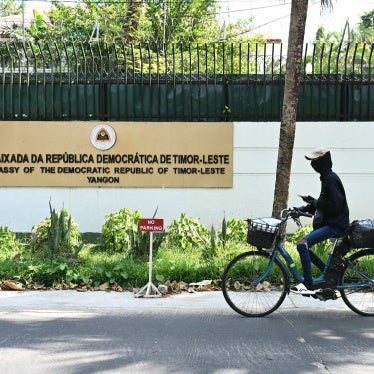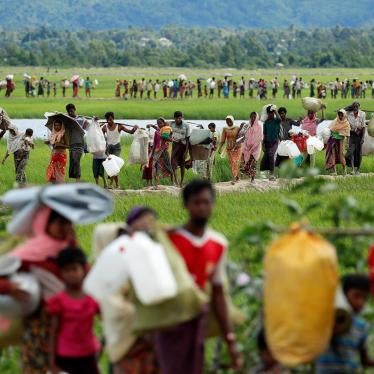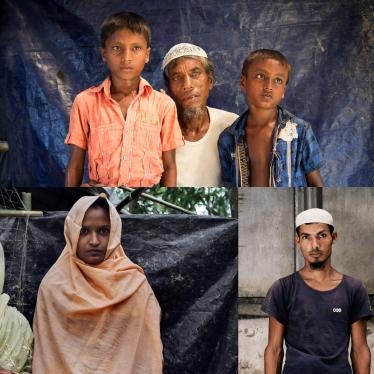(Jakarta) – Today we will be addressing what to do about the 1965 killings. Why do these still matter and how can we properly address them? Obviously the murder of at least half a million people in the course of a few months is one of the most horrendous crimes of our era and certainly of Indonesia’s history.
This is a crime of such a magnitude that it cannot be swept under the rug. Families remember, the survivors remember, the descendants remember. And they are bearing a wound that they want addressed.
This is also relevant for today; this is not simply a matter of ancient history. It is of relevance because Indonesia remains a society and a country of many divisions—there are religious differences, ethnic differences, and territorial differences. And a big question for Indonesia today is how does one bridge those differences?
1965 represents a terrible precedent for how to address differences. It represents a precedent of forcing those differences away through mass murder. And because Indonesia has not really addressed this past, it remains an option. The way to inoculate society against a recurrence is to openly address the events of 1965, tell the truth about them, acknowledge them, have justice where possible, and then move forward. But trying to forget the past, or censor the past, may condemn Indonesia to repeat the past. Human Rights Watch believes it is extremely important that a different approach be taken.
Although I speak here as the representative of an international organization, this is not an international or foreign demand, this is an Indonesian demand. I have heard in the course of my visit—and my colleagues Andreas Harsono and others have heard through many, many years of work here—that the deep desire to address these horrendous crimes is felt passionately and urgently by many Indonesians.
It is obviously felt by the survivors, obviously by the families, but also by many ordinary Indonesians who might not have been personally touched by the killings but nonetheless want to build a society founded on the truthful acknowledgment of the past and a determination, on the basis of knowledge not forgetting, of moving forward and never repeating that kind of lawlessness. This is a deeply Indonesian, a deeply national, demand. This has nothing to do with foreign desires.
Next week, as many of you know, the government is hosting a symposium on this topic. This is a very important first step. And we want to acknowledge that the government is taking a step toward a new approach; it is not repeating the forgetfulness of the past. It is making an initial effort to address the past.
There are several options on the table as to what can be done. I want to begin with one that may not be imminent but is important to acknowledge nonetheless. That is justice. When you have crimes of this magnitude, mass murder involving hundreds of thousands of people, it is important ultimately for the architects of this slaughter to be brought to justice. It is never possible with crimes involving this many people to bring all the day-to-day murders to account. That is an unfortunate practical reality.
I’m also aware that 50 years later, it’s not clear how many of the architects of the killings are still alive. So there may be practical limits to the justice option, but it is always critical to seek justice, targeting the architects, the directors, those who oversaw the mass killing.
A second channel is what’s been termed rehabilitation. A senior official told me just yesterday that the 1981 presidential decree on “Clean Environment” (bersih lingkungan) issued by President Suharto has never been repealed and continues to be used against victims and descendants of the victims of the 1965 killings, and those alleged to have had links to the Communist Party. This is obviously a deep injustice, a classic example of collective punishment banned under international law. The senior official told me that as many as 40 million people in Indonesia today may be affected—this includes victims as well as relatives and descendants of victims. He said that this is one important reason that politicians always mention human rights in their election campaigns, they know there’s a big group of people who are affected.
These are people who’ve never done anything wrong, they may have had a grandparent or a great-grandparent allegedly affiliated with the Communist Party. Ending the blacklisting is obviously an important step, and, frankly, the sooner the better. There is no need for a lengthy process. This is a decree that can be reversed with another decree and we’d like to see that happen now. Clearly the organizers of the symposium are interested in this and they can show quick action by pushing the government to act on it.
The more difficult issue is the broader question of how you address these past atrocities. There is clearly interest among the Indonesian officials we met with in some kind of apology, some kind of compensation, and some kind of reconciliation. Those are all good things. The question is when do they happen? In particular, do they happen before or after a process of telling the truth about the past?
In our view, you can’t apologize over a blank slate, you can’t reconcile around censorship, and you can’t be compensated for a closed door. What is needed is to begin with a truth-telling process—to begin with an opportunity for the survivors, perhaps some of the perpetrators of killings, for the descendants of victims, to speak publicly, offer their public testimony, so that the Indonesian people can hear these firsthand accounts. This kind of public hearing process would lay a factual basis for what we presume would then be some kind of official truth commission report.
And when that has happened, then it is possible for the government to acknowledge what has happened; then it is possible for the government to express its sorrow for what happened, to apologize; then it is possible for the government to compensate victims or their descendants for what they endured. Those are meaningful actions on the basis of a factual record. They are not meaningful on the basis of a closed information environment.
So in assessing the results of the symposium we are going to be looking in particular at whether there is the initiation of a real, meaningful truth-telling process. That is an essential element of an effective accountability process. Dozens of countries around the world have had truth commissions shed light on past atrocities, issues that are always very difficult matters to address. Why not Indonesia?
The final thing I want to mention is the role of the United States in this. There are still US government records about what happened in 1965 that have not yet been released. We want to learn more about the working-level involvement between the US government and the killers in 1965. Who knew what, and what were the channels of communication? Were names conveyed by the US government and, if so, what happened to those people? It’s this kind of operational detail, including CIA messages, that it would be very useful to know as part of the broader effort to tell the story of 1965. This is not a substitute for an Indonesian process; it’s one part of a larger truth-telling effort. But we think the US could contribute to the larger process by releasing all of its relevant documents to the public.
This is something the US already has done in other cases, so far always in Latin America. Under President Barack Obama, the government opened the US archives into the US role in the so-called “dirty wars” in Brazil and Argentina; previous presidents opened the archives relevant to Chile, El Salvador, and Guatemala. These have been very useful contributions to truth-telling processes in those countries.
As a practical matter, given the expected bureaucratic resistance within certain parts of the US government, particularly the CIA, the US does this when the country concerned formally requests the documents and is conducting a meaningful truth-telling process. Now in the case of Indonesia, the national human rights commission, Komnas-HAM, has made a formal request to the Obama administration for the documents, and that is very important. In our meetings with Indonesian officials, we have urged the Indonesian government itself to add its voice requesting that the US government open its archives. Similarly, we hope the symposium launches a process that allows the US government to see that a genuine truth-telling process is underway in Indonesia, and that the release of the US archives would make a contribution to such a process.
If that happens, if there is a clear Indonesian government request for the US to fully open its books, and if its request is in furtherance of a meaningful truth-telling process within Indonesia, we’re confident that President Obama will do the right thing and open the archives, as he has done in other cases. We realize that there is resistance within Indonesia from the army, the Islamic organization Nahdlatul Ulama, and others.
Some are not eager for a truth-telling process to go forward. This is where civil society has a role to play. The more the press clamors for a truth-telling process, the more civil society joins in, the more that President Jokowi will have the political backing needed to overcome this resistance and to move forward both in telling the truth here in Indonesia and in requesting the assistance of the US and other governments to open up their archives and contribute their part to the historical record.
So we see the symposium next week as the beginning of what we hope is a historic turn: the beginning of a government-backed effort to really come to terms with this ugly period of Indonesia’s past, and to move forward in a way that no longer sweeps this matter under the rug, but reveals as fully as possible what happened, acknowledges it, and lays the foundation for addressing societal divisions according to the rule of law. That is the best way of ensuring that Indonesia will never repeat this terrible period again.
Thank you.









